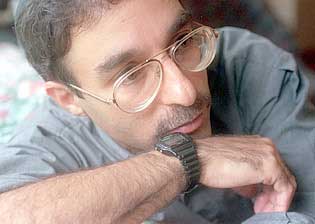[images
added by this website]
Supreme Court
refuses case of alleged religious
discrimination
By Matthew E. Berger
 WASHINGTON,
Nov. 30 (JTA) -- A Jewish Army
engineer who claims
he suffered religious discrimination won't get
his day in court. The U.S. Supreme Court on
Monday rejected the case of David
Tenenbaum, who claimed he was subjected to
11 years of investigations and discrimination
because he was Jewish and was feared to be
spying for Israel.
WASHINGTON,
Nov. 30 (JTA) -- A Jewish Army
engineer who claims
he suffered religious discrimination won't get
his day in court. The U.S. Supreme Court on
Monday rejected the case of David
Tenenbaum, who claimed he was subjected to
11 years of investigations and discrimination
because he was Jewish and was feared to be
spying for Israel.

The high court agreed with lower federal
courts that dismissed the case, saying the U.S.
government could not properly defend itself
without revealing sensitive national security
information.
The Tenenbaum case made headlines in 1997,
when Tenenbaum allegedly admitted in a polygraph
test that he had
inadvertently shared
classified documents with Israeli military
officials, a charge Tenenbaum's lawyer
disputes. The FBI and U.S. Army investigated
Tenenbaum several times, even raiding his home
on the Sabbath.
Some saw the case as a reverberation of
anti-Israel and anti-Jewish bias in government
following the conviction of Jonathan
Pollard, a U.S. Navy analyst sentenced
in 1986 to life in prison for spying for Israel.
The latest ruling suggests that those accused of
unlawful ties with Israel may have little
recourse.
After Tenenbaum sued several federal agencies
in 1998, U.S. officials claimed they couldn't
defend the government without divulging
classified materials. Later, the current deputy
secretary of defense, Paul Wolfowitz, who
is Jewish, wrote that revealing material
relevant to Tenenbaum's case could cause
"serious damage to the national security." A
District Court ruled for the government in 2002,
and the Sixth Circuit Court of Appeals concurred
in May.
Tenenbaum's lawyer says the government is
using the state-secrets doctrine -- which allows
the government to withhold information from a
court case when disclosure would risk national
security -- to mask religious discrimination.
"Every time you want to hide your misbehavior
all you have to do is say it's a secret, and you
get away with it," Mayer Morganroth
said.
But a spokesman for the U.S. Attorney's
Office in Detroit said both courts received the
information the government wanted to keep
secret, and agreed with Wolfowitz. "It's not a
unilateral, executive act," Peter Caplan
told The Associated Press. "The courts play a
role in the case and are able to see the
information and evaluate whether the government
is turning square corners."
Morganroth said Tenenbaum was investigated
for 11 years and was falsely accused of spying
for Israel because of his close ties to Israeli
officials in Michigan. Tenenbaum, who is an
Orthodox Jew and is fluent in Hebrew, remains an
engineer at the U.S. Army Tank Automotive and
Armaments Command in Warren, Mich. After the
investigations were concluded, he received
"top-secret" clearance. Yet some co-workers
"still think of him as a spy and still treat him
like one," Morganroth said.
American Jewish groups have been reluctant to
get involved in the case, acknowledging the
legitimacy of the state-secrets doctrine. "It's
somewhat troublesome, but there may not be any
way around it," said Marc Stern, the
American Jewish Congress' general counsel. "The
question is how to make sure the provision is
not used improperly, to cover religious
discrimination."
Morganroth said his only remaining option is
to seek relief through Congress, saying Sen.
Carl Levin (D-Mich.) had expressed an
interest in drafting a bill that would provide
Tenenbaum with compensation and would address
problems of religious discrimination in military
classification. Levin's office said Tuesday that
it had been contacted by Tenenbaum's attorney
and would be looking into the matter.
© JTA.